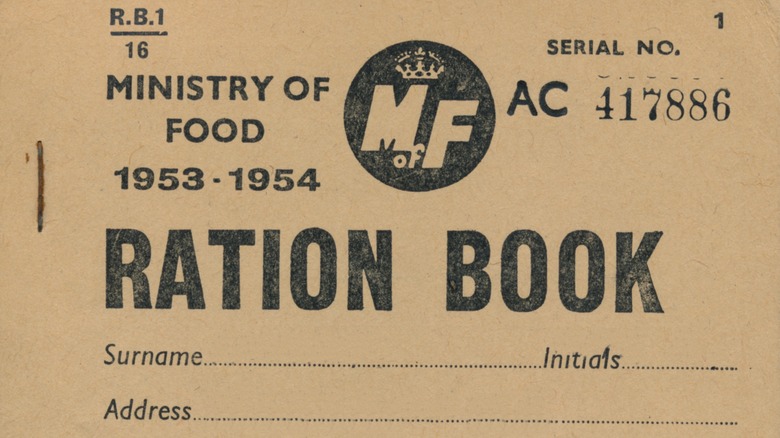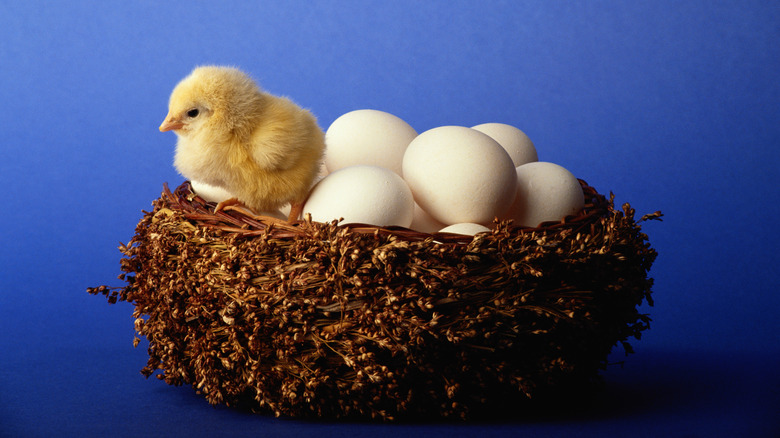Hugh B. Cott And The Palatability Of Eggs Study
People and our evolutionary ancestors have been eating eggs since humankind came into existence, according to Food Timeline. Around 1400 BCE (as far as the archaeological record has been able to deduce) we domesticated fowl for their meat and eggs. Most Western eaters are familiar with chicken eggs, although turkey eggs and duck eggs can also be found on the shelves of specialty grocers, or from some farmers, if you know where to look.
However, there are about 18,000 bird species in the world, according to the American Museum of Natural History (via Science Daily), all of which produce eggs. Some eggs, such as those of the hummingbird, are smaller than a dime, according to All About Birds, and thus, wouldn't make much sense as a food source for humans. Others, such as those of the ostrich, are larger than a human hand, according to the National Zoo, and might feed a whole family with one egg.
But do the eggs of birds outside of those we've traditionally domesticated taste good? A British scientist set to find that out, although whether he was motivated by the quest for an alternative food source, or simply wanted to find out for himself, is uncertain. Either way, as Weird Universe explains, science owes a debt to Hugh B. Cott, who boldly went where no scientist before him had gone and wrote an academic paper about how "exotic" birds' eggs taste.
Post World War II England
You may have learned in school that World War II, despite the devastating costs it inflicted, was a financial boon to the United States in that it helped bring the U.S. out of the Great Depression and into prosperity, as Forbes reports. That was not the case, however, in Europe, and as regards this article, in England in particular. As Historic U.K. reports, the country had, like the United States, instituted rationing during the war. However, unlike the U.S., rationing in the U.K. continued well into the next decade and didn't officially end until 1958, as the country's agricultural and food-distribution infrastructures repaired themselves following the devastation and privations of the war.
Enter Dr. Hugh B. Cott. He was a zoologist who, according to The University of Glasgow, published papers on military and natural camouflage. However, as Weird Universe reports, he was also (maybe, probably) interested in whether or not Britons' needs for eggs could be supplied by birds other than chickens (and to a lesser extent, turkeys and ducks and quail and such). This was not idle curiosity: another war could devastate the poultry industry again, and as 2023 Americans will gladly tell you, domestic poultry is subject to diseases that can decimate the industry (it's the reason egg prices were so high at the beginning of 2023). He hired a team of tasters, gathered up eggs from scores of other bird species, and published his results.
So Which Eggs Taste Best And Worst?
The difference between science and screwing around is writing it down, as Adam Savage famously said on "Mythbusters." So is, as Weird Universe describes it, gathering up the eggs of 212 bird species, scrambling them, then serving them to tasters who rate them on a scale from 1 to 10 — science, or is it screwing around? We're going to say "science," since if there's an academic paper about it, it transcends "screwing around."
"The palatability of the eggs of birds: mainly based upon observations of an Egg Panel" was published in 1954. Though it survived peer review, there are several problems with this paper. First of all, the tasters' opinions are just that: subjective opinions, and not objective science. For another, the team sampled the eggs of only 212 species of birds, out of thousands upon thousands of species. And for another, they cooked them, prompting another researcher to object; "What predators ever experienced cooked eggs?" zoologist Tim Birkhead asked, suggesting that the researchers should have eaten them raw.
As for the best tasting of the sampled eggs, you're going to be disappointed. The winner, with a score of 8.8, was the good old domestic hen. The eggs of the coot, moorhen, and lesser black-backed gull came in at a close second. Penguin eggs were described as having a delicate flavor. The nastiest eggs were those of the great tit ("salty, fishy, and bitter"), the wren ("sour, oily"), and the oyster-catcher ("strong onion-like flavor").


